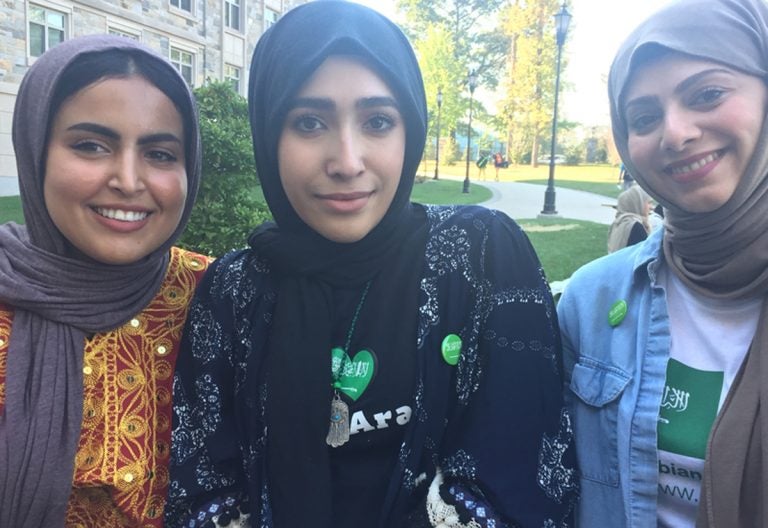Saudi women celebrate removal of driving ban
Saudi Arabia is the only country in the world where women are not allowed to drive. So you can imagine how Elanood Alhindi felt when she heard the ban is being lifted.
Listen 0:00
St. Joe’s students Elanood Alhindi, Roa Alshaer and Heba Alawami say driving will change life for women in Saudi Arabia. (Annette John-Hall/WHYY)
Saudi Arabia is the only country in the world where women are not allowed to drive. So you can imagine how Elanood Alhindi felt when she heard the news that her native country had lifted the longstanding driving ban, effective in June.
“I was soooo happy!” raved Alhindi.
Alhindi is a graduate student in at St. Joseph’s University. When she heard the news on social media that Crown Prince Mohammed bin Salman had issued a royal decree to end the ban that prevented 43 million women in the country from driving, Alhindi said she couldn’t wait to go back home and get her license.
She is licensed to drive her Kia here in the U.S. But she says getting behind the wheel is an act of independence most Saudi women never get to experience. Instead, women must depend on men in their lives, ride shares, or hired drivers to get them around.
“It’s a great feeling when you want something you just go get it,” Alhindi said. “You don’t have to wait for someone. You don’t have to call the driver. You don’t have to deal with his moods. Driving is going to be life-changing for us in Saudi.”
Alhindi, along with classmates Heba Alawami and Roa Alshaer recently celebrated Saudi National Day at St. Joe’s. On a recent fall afternoon, Saudi students mingled on a grassy courtyard, passing out information about Saudi Arabia and its people and selling Saudi goods.
Alhindi wore a traditional Saudi garment, embroidered with sequins. Her friends wore stylish dusters over t-shirts and jeans. All donned headscarves and pins bearing the kingdom’s flag.
In Saudi Arabia, a typical middle-class family owns two vehicles — one driven by the man of the house and the second for a driver to transport the wife and children. Often, the simple act of scheduling transport times is an exercise in frustration.
“I have a sister who works,” said Alawami. “And my mom needs to get some groceries and she needs to take the driver, too. So, yeah, it’s so difficult for us back there not to be able to drive.”
The new policy is a win-win for Saudi Arabia, said Leslie Rogne Schumacher, an assistant professor of history at St. Joe’s. But he points out that while driving symbolizes a hard-fought right for women, the government’s action was fueled more by its own Vision 2030 plan to energize the economy and workforce than ensuring women’s rights.
“The government has certain economic goals that they would like to achieve and if the liberation of women fits those goals, they’re going to undertake them,” Schumacher said. “That doesn’t mean that the average women in Saudi Arabia woke up in a very different world and a much more free world than when she had gone to bed the night before.”
The ban’s removal comes at a time when Saudi women are still restricted by a male-dominated regime from going about their everyday lives. For instance, women cannot work, undergo some medical procedures, or travel without asking a male guardian for permission.
But Alshaer says it’s not as bad as it sounds.
“Me, personally, I’m not affected by it at all. My father, when he gives us his passports, he gives us that allowance so I don’t think about it at all, it’s not in my head,” she said. “But I know some women are affected by these rules.”
And she points out women recently got the right to vote in 2011, so she believes the country is moving in the right direction — and in one way, it’s slightly further ahead than the U.S.
In 2013, Saudi Arabia mandated that women make up 20 percent of the 150-member Shura Council, the country’s legislative branch. In the U.S., the number of women in Congress has been stuck at 19 percent for more than a decade.
“I was surprised by that. Yay Saudi!” Alshaer said.
And Alhindi said most Saudi women are able to continue their education abroad, thanks to the government.
“Who else gets a full scholarship from their country?” Alhindi said. “We thank Saudi Arabia and we love it more for the new law. We love it more.”
WHYY is your source for fact-based, in-depth journalism and information. As a nonprofit organization, we rely on financial support from readers like you. Please give today.




